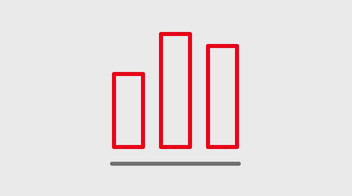Development in the year under review
- Volume declines in the energy-intensive steel and chemical industries, as well as in the Trans-Eurasian corridor. Coal transport, automotive transport services and the project business are developing positively and are having a supportive effect.
- Challenging environment due to strikes in Germany, France and the United Kingdom as well as construction-related restrictions on the German network.
- Rising factor costs and additional burdens continue to put pressure on economic development and lead to the need for price adjustments.
DB Cargo | 2023 | 2022 | Change | |
absolute | % | |||
Punctuality (%) | 69.7 | 66.3 | +3.4 | – |
Customer satisfaction (grade) | 2.8 | 2.7 | +0.1 | – |
Freight carried (million t) | 197.6 | 222.3 | –24.7 | –11.1 |
Volume sold (million tkm) | 74,458 | 84,468 | –10,010 | –11.9 |
Volume produced (million train-path km) | 146.9 | 169.1 | –22.2 | –13.1 |
Capacity utilization (t per train) | 506.7 | 499.4 | +7.3 | +1.5 |
Total revenues (€ million) | 5,582 | 5,244 | +338 | +6.4 |
External revenues (€ million) | 5,279 | 4,998 | +281 | +5.6 |
EBITDA adjusted (€ million) | –74 | –257 | +183 | –71.2 |
EBIT adjusted (€ million) | –497 | –665 | +168 | –25.3 |
EBIT margin (adjusted) (%) | –8.9 | –12.7 | +3.8 | – |
Gross capital expenditures (€ million) | 319 | 452 | –133 | –29.4 |
Employees as of Dec 31 (FTE) | 31,359 | 31,167 | +192 | +0.6 |
Employees annual average (FTE) | 31,558 | 31,027 | +531 | +1.7 |
Employee satisfaction (SI) | – | 3.8 | – | – |
Share of women as of Dec 31 (%) | 13.2 | 13.0 | +0.2 | – |
Specific final energy consumption compared to 2006 (based on tkm) 1) (%) | –22.5 | –26.0 | +3.5 | – |
The punctuality of DB Cargo has improved. Measures in production adapted to the resource situation and the volume development had a particularly positive effect. In addition, operational disruptions were reduced due to greater process stability. These developments are one of the reasons why the number of trains in backlog has fallen significantly. Despite the overall good punctuality development, the operational quality was burdened mainly by the challenges of the infrastructure and, in particular, the increased network construction impact from September.
Customer satisfaction at DB Cargo declined slightly in 2023. The main driver of overall customer satisfaction at DB Cargo is operational performance, with “transport performance” having the primary influence, in addition to “transport information” and “provision of freight cars.” The quality of operational performance strongly depends on the performance capability of the rail infrastructure. Construction sites and disruptions on the track infrastructure can lead to delays in the provision of freight cars and also in the arrival of freight cars/trains at recipients’ sites, as well as to longer journey durations and, in some cases, to complete cancellations of trains.
In addition, the price adjustments implemented also influenced customer satisfaction and contributed to the decline in overall satisfaction in 2023.
Freight carried as well as volume sold and volume produced, declined in 2023. This was driven by a decline in transports in the energy-intensive steel and chemical sectors, as well as in intermodal transport in Germany and on the Eurasian corridor. Strikes in Germany, France and the United Kingdom, as well as the effects of the war in Ukraine, also led to weaker demand. Capacity utilization increased somewhat, partly due to the higher proportion of coal traffic for securing the energy supply.
Economic development was better despite the decline in volumes for steel, chemicals and intermodal transport: operating profit figures increased, but adjusted EBIT remained markedly negative. Higher expenses due to inflation were more than offset by an increase in income.
- Revenues (+6.4%/€ +338 million): Significant increase, driven by the positive development in Central and Eastern Europe, which was mainly caused by price-related factors.
- Other operating income (+6.4%/€ +33 million): This increase was driven, inter alia, by higher facility price support in Germany and the support for single wagon transport in France, as well as compensation payments in the United Kingdom due to strikes. This was counteracted by the omission of reimbursements in connection with the noise-based train-path pricing system in 2022.
On the expense side, there were rises due to inflation and quality, driven primarily by increases in personnel expenses and cost of materials:
- Personnel expenses (+4.5%/€ +88 million): Increase, largely as a result of collective bargaining agreements and a higher average number of employees.
- Other operating expenses (+6.0%/€ +46 million): Increase due in part to the newly introduced intra-Group charges and impairments for customer receivables at a subsidiary. This contrasts with the change in the presentation of compensation payments to DB Cargo Logistics.
- Cost of materials (+1.4%/€ +46 million): Increase mainly due to higher energy costs, which in Germany were only partially compensated by the effects of the electricity price brake. Price-induced cost increases for purchased transport services also had an impact. Maintenance expenses increased mainly due to changes in the accounting of large inspections at foreign companies previously shown as capital expenditures. The performance development had an opposite effect.
- Depreciation (+3.7%/€ +15 million): Increase mainly due to more long-term vehicle rentals subject to mandatory capitalization (IFRS 16).
The decline in capital expenditures is mainly the result of a change in the accounting of major inspections that were previously shown as capital expenditures. Secondly, delays in vehicle projects also had a reducing effect.
The number of employees increased slightly as a result of the positive performance development in Eastern Europe, dampened by the negative performance development in Central Europe.
DB Cargo’s recruitment initiatives focused on the recruitment of women. The share of women has increased slightly as a result of these targeted recruitment measures.
The drop in specific final energy consumption compared to 2006 weakened slightly in 2023 compared to the previous year. This was mainly the result of the decline in volume sold and the tense operating situation on construction sites and due to quality.
Central Europe region
- Declines in volumes in energy-intensive industries and in intermodal transport – especially Trans-Eurasian transport affected by low ocean freight rates.
- Increased expenses due to price increases, especially for energy and purchased transport services.
- Operating profit development still under pressure.
Central Europe region | 2023 | 2022 | Change | |
absolute | % | |||
Freight carried (million t) | 203.9 | 232.7 | –28.8 | –12.4 |
Volume sold (million tkm) | 59,386 | 68,313 | –8,927 | –13.1 |
Volume produced (million train-path km) | 116.4 | 136.1 | –19.7 | –14.5 |
Total revenues (€ million) | 5,643 | 5,348 | +295 | +5.5 |
External revenues (€ million) | 3,945 | 3,688 | +257 | +7.0 |
EBITDA adjusted (€ million) | –188 | –387 | +199 | –51.4 |
EBIT adjusted (€ million) | –489 | –679 | +190 | –28.0 |
Gross capital expenditures (€ million) | 206 | 327 | –121 | –37.0 |
Employees as of Dec 31 (FTE) | 21,992 | 22,148 | –156 | –0.7 |
Performance development in Central Europe declined significantly due to market developments (decreases in demand for steel and chemical transport and intermodal transport) and the EVG’s and GDL’s strike action. Additional coal transport for securing the energy supply in Germany, on the other hand, had a positive impact.
Economic development has improved, but is still very challenging due to the operational and economical situation. The operating profit figures improved, driven by revenue development, but remained noticeably negative:
- Income increased significantly. The performance-related decline was more than offset by price effects. Government grants for single wagon transport also increased. One of the dampening effects was the omission of reimbursements in connection with the noise-based train-path pricing system in 2022.
- Expenses increased slightly. The main drivers were higher maintenance expenses, also due to a change in accounting for major inspections that were previously shown as capital expenditures and higher energy expenses due to price effects, which were only partially compensated in Germany by the effects of the electricity price brake. Apart from this, personnel expenses increased as a result of collective bargaining agreements and the Group charges introduced in 2023 increased expenses. This was counteracted by volume-driven lower purchased transport services, train-path utilization and rental of freight cars.
Capital expenditures decreased as a result of a change in the reporting of major inspections. In addition, the contract volume of long-term rental contracts for freight cars was reduced.
The number of employees fell slightly in the second half-year as a result of the decline in volume.
Western Europe region
- The difficult market environment and strikes in the United Kingdom and France also put pressure on development.
- Negative impacts due to higher prices, especially for energy.
- Operating profit development significantly under pressure.
Western Europe region | 2023 | 2022 | Change | |
absolute | % | |||
Freight carried (million t) | 35.0 | 40.2 | –5.2 | –12.9 |
Volume sold (million tkm) | 9,156 | 10,535 | –1,379 | –13.1 |
Volume produced (million train-path km) | 21.4 | 24.3 | –2.9 | –11.9 |
Total revenues (€ million) | 751 | 748 | +3 | +0.4 |
External revenues (€ million) | 531 | 549 | –18 | –3.3 |
EBITDA adjusted (€ million) | 38 | 64 | –26 | –40.6 |
EBIT adjusted (€ million) | –41 | –20 | –21 | +105 |
Gross capital expenditures (€ million) | 37 | 45 | –8 | –17.8 |
Employees as of Dec 31 (FTE) | 4,321 | 4,369 | –48 | –1.1 |
Performance development in Western Europe was significantly below the level of the previous year.
- Declines in demand due to the economic situation and strikes had a negative impact on DB Cargo UK and DB Cargo France.
- As a result of the strikes in France and the United Kingdom, Spain also saw reductions in traffic to Germany and to the United Kingdom.
Economic development was weaker and remained challenging. Operating profit figures fell, driven by increased expenses, which more than consumed the income growth.
- Income was slightly above the previous year’s level.
The main drivers were price adjustments in France and higher income from compensation payments in the United Kingdom. Performance-related declines in the United Kingdom and lower income at Transfesa in Spain partially compensated for this. - However, expenses rose more sharply. The main drivers were increased costs for energy and maintenance. Costs were also incurred in connection with a lost lawsuit in France. In contrast, performance-related declines in the cost of materials and lower depreciation had a cost-reducing effect. Personnel expenses were at about the same level as the previous year as a result of collective wage effects, which were offset by a lower number of employees in the United Kingdom.
Capital expenditures decreased as a result of a change in the reporting of major audits. In addition, there were delays in various capital expenditure projects.
The number of employees fell, particularly in operational areas for traction unit drivers in the United Kingdom.
Eastern Europe region
- Decreases in performance as a result of the war in Ukraine were more than compensated for by new internal transport.
- Higher expenses due to increased factor costs, particularly for energy.
Eastern Europe region | 2023 | 2022 | Change | |
absolute | % | |||
Freight carried (million t) | 18.5 | 19.5 | –1.0 | –5.1 |
Volume sold (million tkm) | 5,916 | 5,621 | +295 | +5.2 |
Volume produced (million train-path km) | 9.2 | 8.8 | +0.4 | +4.5 |
Total revenues (€ million) | 505 | 395 | +110 | +27.8 |
External revenues (€ million) | 316 | 242 | +74 | +30.6 |
EBITDA adjusted (€ million) | 52 | 42 | +10 | +23.8 |
EBIT adjusted (€ million) | 16 | 15 | +1 | +6.7 |
Gross capital expenditures (€ million) | 68 | 57 | +11 | +19.3 |
Employees as of Dec 31 (FTE) | 4,366 | 4,021 | +345 | +8.6 |
The performance development in Eastern Europe was slightly positive, driven by new traffic in Poland and Romania.
As a result, operating profit figures also improved significantly. The main reason for this was the development of income:
- Income increased significantly. This was mainly due to new transport services and price effects. Higher income from insurance benefits at DB Cargo Polska and higher revenues from the leasing of freight cars at DB Cargo Romania had a supporting effect.
- Expenses increased significantly, but at a disproportionately high rate. The main drivers were increased personnel expenses due to collective bargaining agreements and for performance-related reasons, rising prices for purchased transport services and energy, and increased maintenance expenses as a result of a change in accounting for major inspections that were previously shown as capital expenditures. Higher repair costs for locomotives in Romania and effects from additions to provisions for cargo damage in Poland had a reinforcing effect, as did higher depreciation due to capital expenditures.
Gross capital expenditures increased significantly due to the extension of existing long-term rental contracts for locomotives in Romania and Hungary. Investment grants decreased as capital expenditures in Poland were supported by the EU in the previous year.
The number of employees increased as a result of the performance development in Romania.
FLS
- The war in Ukraine and energy price increases resulted in massive declines in demand in the Eurasian corridor.
- Additional declines in demand due to further economic development.
FLS | 2023 | 2022 | Change | |
absolute | % | |||
Total revenues (€ million) | 606 | 658 | –52 | –7.9 |
External revenues (€ million) | 487 | 520 | –33 | –6.3 |
EBITDA adjusted (€ million) | 24 | 24 | – | – |
EBIT adjusted (€ million) | 17 | 19 | –2 | –10.5 |
Gross capital expenditures (€ million) | 8 | 21 | –13 | –61.9 |
Employees as of Dec 31 (FTE) | 680 | 629 | +51 | +8.1 |
The economic development of the FLS line of business was slightly below the level of the previous year. Income and expenses decreased to about the same extent:
- Income declined. This was driven by revenue losses in Eurasian business as a result of the war in Ukraine. The takeover of DB Cargo Italia services (special transports), which were reported in the Central Europe region in the previous year, had a dampening effect.
- Expenses decreased proportionally to income. The main reason for this was lower freight rates for truck transport. In contrast, the increase in personnel expenses, mainly due to the higher number of employees, partially compensated for this.
Gross capital expenditures fell due to delays in various capital expenditures projects, in particular for the purchase of trailers.
The number of employees increased mainly due to the allocation of DB Cargo Italia Services to the FLS line of business.


